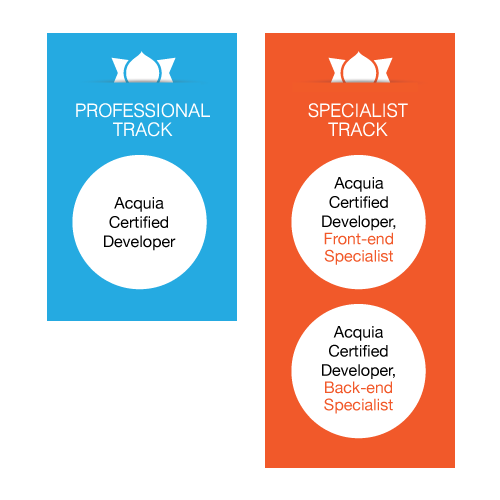Jump straight to my notes on the exam itself.
Most people hate exams and I am no different. Coming from an Indian education background where exams are poorly planned, I was less than excited when I was asked by my company, Axelerant, to take the Acquia Certified Developer test back in August. I have been breathing, eating and living Drupal since a few years now but the prospect of an exam put me at unease. I eventually gave the exam after a bit of preparation and was surprised to find it such a pleasant experience. I wish I could say it was perfect, but at least it was better than I feared. In fact, when I heard that Acquia was launching specialist exams, I felt an inclination to take them.
This is why when I was contacted by someone at Acquia to pre-take the frontend developer exam, I jumped at the chance. I had to get it delayed as I was out of town for two weeks and eventually took the exam online from home after I was back. I would have preferred a test centre like my previous exam but pre-exams have to be given online. I installed the software and setup my biometric profile that afternoon and made sure I was ready.
NOTE: I have included links to various hand picked resources below in line with text. I would recommend you to read through them if you are attempting the exam.
Preparation
I was just back from a hectic trip and under the weather but skimmed through various resources best I could. I went through the list at Tanay’s blog (which is mostly an expanded version of the frontend section from his post on the Acquia Certified Developer exam). I also used my book “Definitive Guide to Drupal 7” (buy from Amazon) to read chapters 14-16 (first two available online). Tanay links to the specific sections in that book in his post but I skimmed through the entire thing anyway. In any case, if you have worked with Drupal themes, you don’t need to do more than just a read-through.
The Exam
The topics tested in the exam are as follows:
- Fundamental Web Development Concepts
- Theming concepts
- Sub-theming concepts
- Templates
- Template functions
- Layout Configuration
- Performance
- Security
The bulk of the focus is the Drupal theming layer, i.e., creating templates and using proper techniques like preprocessing and theme hooks. There is significant focus on web development fundamentals as well but the questions are mostly simple and straight-forward. There are also questions on using core modules and views but they are not too many. For web development, make sure you are familiar with HTML 5, CSS concepts (like specificity), JavaScript, jQuery and web security concepts (like XSS). Remember to study JavaScript as well, not just jQuery.
Since this is related to Drupal, pick up Drupal theming concepts before attempting the exam. If you work on Drupal themes, but just on the tpl, css and javascript, it is not going to be enough. You need some experience with theme hooks and the preprocess concepts to pass the exam. Also, all aspects of theme inheritance (in .info file, templates, preprocess functions or hooks, etc…) and other common topics like behaviors are very important to crack the exam.
IMPORTANT: Use the links above, but also see the list at Tanay’s blog on this exam, and even the chapters 14-16 in Definitive Guide to Drupal 7. Chapters 14 and 15 are available online. Do not attempt the exam if you are not experienced with Drupal theming or general web frontend development.
Overall, I found it to be an even mix of easy and hard questions. I took 78 minutes on my test by being extra cautious that I was reading each question and options correctly. The devil is in the details, after all. At the end, I reviewed some of the complex questions (there is a handy option to mark questions for later review – use it) and submitted the exam. I received the results instantly on the screen, and then also in an email.
I usually get very nervous before any exam but I think I did well here. Do your best to prepare for the exam but as long as you have enough experience with Drupal themes and frontend concepts, you do not have to worry.
The exam opens on December 1st, 2014. I hope this post was useful in helping you prepare for the exam. I am grateful to Acquia Certification Team for offering me to take the pre-exam and also Tanay’s blog post which I used to check off items to prepare.
